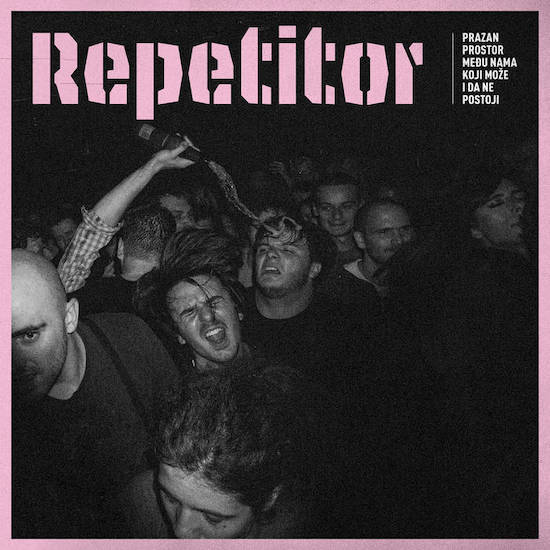Belgrade’s Repetitor are probably the angriest band I know. The recent spittle generated by the IDLES and Fat White Family tiff, for example, is mere sandpit shenanigans compared with the tsunami of bile “at the state of things” the brilliant Serbian trio can summon up.
Repetitor, you see, have long seated, ingrained beefs with the world that are not easily healed. Their albums are concentrated attacks on society at large, barings of the soul, open-wound ululations against the injustices and irritations of living in modern day Serbia. Their live shows are lambent flames of righteous anger and frustration, driven by the sort of guitar-and-drums dynamics that cause walls to collapse. Even if you can’t understand a word of Serbo-Croat (and I can’t without considerable help), you know instantly that the music they make is the real deal.
It is not an exaggeration to say that their music has, over the last 10 years or so, (certainly given the shows I’ve witnessed in the Balkans and elsewhere in Europe), become a soundtrack for Serbian and ex-Yugoslav youth: two post-war generations summarised in the title of one of their new songs, ‘roba s greškom’: damaged goods.
To date they’ve made three highly impressive albums. The first for their current label, Ljubljana’s Moonlee, 2012’s Dobrodošli Na Okean, is a masterpiece of punk rock anger, possibly my favourite “European” rock record of the last decade. The follow up, 2016’s <>Gde Ćeš is a sleeker beast that – whilst content to bask in its own power – can still tear a strip of flesh from the unprepared listener. Live and on record, they trust in a simple formula, one that makes you want to bare your chest, run out onto your balcony and howl supplications to Venus in her guise as the morning star. The guitar switches from irritated, scratchy delineations of the melody and rhythm to a full-throttle roar with plenty of grunge elements. Whereas the bass and drums lock into what can best be described as the Atlantic crashing and foaming on the rocks of a darkened headland. It never fails to excite.
Prazan prostor među nama koji može i da ne postoji is their fourth album and it contains a number of deviations from their trusted formula. Be warned: we get children singing on the penultimate track. Singer Boris Vlastelica recently got married. Is this the end of the road, as with so many other things in this uncertain world?
Well, yes and no, like all good curates’ eggs. The most noticeable difference is a more equal sharing of the vocal duties, as both drummer Milena Milutinović and bassist Ana-Marija Cupin add new perspectives to the band’s sonic worldview. ‘Kroz Vetar’ (Through the Wind), sung by Ana-Marija, is a slow burning incantation that forever threatens to take off but is content to wind about a bass loop, like the Lambton Worm coiled around its mound. It is the sister of the album’s other slowie, the magnificent doom-anthem, ‘Roba s Greškom’ (Damaged Goods). Elsewhere, ‘Sa Izvora’ (From The Source) sees the combustible livewire Milena howl out her message whilst destroying her kit, in grand tradition.
For those who know the band’s previous two records, another change to take on board is found in the closing two tracks, ‘Danima’ (For Days) and ‘Noćima’ (Night). Both cuts herald the introduction of other elements outside guitar and drums; though they aren’t really the key to the softer side of Repetitor, more a sign of their lugubriousness and ever-present black humour, makeshift kid’s choir or not. ‘Danima’ is about living like a hermit, watching “the garbage pile up on the terrace” whilst ‘Noćima’ seems to be a cry for company. In both, Boris Vlastelica’s voice is never really ever far away from letting a discontented growl colour the tone. These sorts of tracks – in my reckoning anyway – hark back in spirit and style to a longer tradition of underground protest singing in cafes and late night pubs, a sort of folk music that sprung up in the 1960s and 1970s throughout the former Eastern Bloc.
Still: the quarrelsome, growling opener, ‘Džungla’ (Jungle) kicks off as if the band has never been away. Milutinović and Cupin create the subterranean rumble over which Vlastelica vents his spleen. ‘Gorim’ (I’m on Fire) is a classic Repetitor cut, their trademark light-heavy guitar switch leading the way. The single, ‘Kost i Koža’ (Blood and Skin), is a beauty, too: a “heavy” track mounted on such an absurdly simple plod that I would wager that it’s indestructible. The track also employs a very enjoyable glam stomp – doubtless found in some Mesolithic cave – that gets remodelled to rock and employed for extra sinisterness.
And – of course – there is always the band’s message. Frustrations with living, relationships, the old bill, getting loaded, you name it, it’s all there. With the past as an ever-present. Lyrics (translated courtesy of a pal) in ‘Kost i Koža’ give us things like this, for example: “Your words are just glass earrings / Like some kind of ornament, like a weapon of the NATO pact / And I’m sat here, with blood up to my elbows”.
God, they’re good.


